Search the Special Collections and Archives Portal
Search Results

Transcript of interview with Leonard I. Gang and Roberta Gang by Barbara Tabach, September 14, 2016
Date
Archival Collection
Description
Leonard Gang (1935 - ) and Roberta Gang (1940 - ) are both natives of New York, though different boroughs and Jewish traditions. The couple met in 1960 while students at Cornell University and married in 1961. Two years later, Len graduated from New York University School of Law. Leonard had fallen in love with Western United States as boy on a family vacation. So when a notice was posted for a law clerk with the Supreme Court of Nevada, he knew he wanted to apply. When he presented Bobbie with a choice of Alaska or Nevada, she flatly responded that Nevada was as far west as she was willing to move. Thus, began their long and influential residencies in both Carson City and Las Vegas. In Las Vegas, Temple Beth Sholom was quickly a welcoming place to be for the Gang family. While Leonard?s law career flourished, Bobbie realized her energy and commitment to become an advocate for the benefit of the vulnerable. Over the years, she actively participated in the political campaigns of others and even entered the political arena herself, which she discusses in this oral history. During Leonard?s successful legal career, he held positions as Deputy District Attorney and Deputy Public Defender in Clark County and was in private practice. From 1971 ? 1974, he was District Court Judge in Clark County before returning fulltime to private practice. By 1988, Bobbie and Leonard had become forceful lobbyists including representing Nevada Women?s Lobby among others. In 2012, Bobbie received the Virginia Cain Progressive Award from the Washoe County Democratic Party for her leadership and dedication to the rights of others. In this oral history, the Gangs highlight their tireless efforts, the long list of political and civic leaders that they worked alongside of, some of Leonard?s high profile cases, and their Jewish heritage. They are parents of three: Lynne Moore, Karen Schnog, and Joshua Gang.
Text

Transcript of interview with Sonja Saltman by Barbara Tabach, August 18, 2015
Date
Archival Collection
Description
Included in this oral history are reminiscences of Sonja Saltman's personal non-Jewish heritage in Austria, the importance of her grandmother in her life, and how she recalls becoming part of the Jewish community.
Sonja Saltman is a psychologist and philanthropist in Las Vegas, Nevada. She is executive director and co-founder of the Existential Humanistic Institute, a non-profit organization based in San Francisco, California that offers training in existential-humanistic therapy and theory. In 2003 Sonja and her husband Michael Saltman founded the Saltman Center for Conflict Resolution at the University of Nevada, Las Vegas (UNLV) William S. Boyd School of Law. The Saltman Center is focused on research, teaching, and public service related to "the advanced study of the nature of conflict and how to resolve it." A native of Austria, Sonja Saltman also serves as the Honorary Consul for Austria in Las Vegas. The Saltmans are involved with multiple charitable organizations and initiatives, both locally and abroad. Sonja Saltman has served on the boards of the Anti-Defamation League, Nevada Women's Philanthropy, and the Black Mountain Institute. Projects that the couple has supported include the rebuilding of homes and bridges is Bosnia, and Streetball Hafla, a basketball program to improve relations between Jewish and Arab teenagers in Israel. In 2014 Sonja and Michael Saltman were recognized as Distinguished Nevadans by the Nevada System of Higher Education. Included in this oral history are reminiscences of her personal non-Jewish heritage in Austrian, the importance of her grandmother in her life, and how she recalls becoming part of the Jewish community.
Text
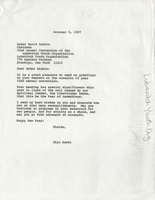
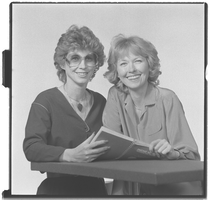
Photographs of Susan Fine and Carol Pastor, 1970s
Date
Archival Collection
Description
Publicity portrait photographs of Susan Fine and Carol Pastor. 120mm negatives.
Image
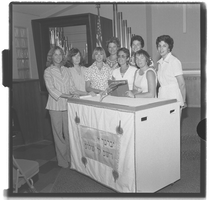
Photographs of Congregation Ner Tamid members, May 10, 1976
Date
Archival Collection
Description
Congregation Ner Tamid publicity photos. 120mm negatives.
Image
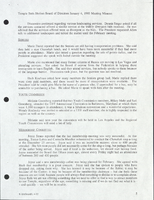
Minutes from Temple Beth Sholom Board of Directors meetings, January 1993 - June 1993
Date
Archival Collection
Description
Meeting minutes include reports from committees of the board, correspondence, and balance sheets.
Text

Transcript of interview with Renee Diamond by Barbara Tabach, November 20, 2014
Date
Archival Collection
Description
In this interview, Renee Diamond discusses coming to Las Vegas via Los Angeles, with her husband and children in the 1970s and getting involved in politics. She talks about her husband, Leo, and his business selling vinyl records in L.A., and her work in a doctor's office. Once in Las Vegas, the Diamonds joined Temple Beth Sholom and later Congregation Ner Tamid. Renee talks about her involvement in the political arena in southern Nevada, including the League of Women Voters.
Community activism and social justice rank high in the legacy of Renee Diamond. She often refers to herself as one of the last of the generation without college degrees that could make a difference in the politics of the state. When Renee, her husband Leo Diamond moved their family to Las Vegas from southern California, the energetic advocate Renee quickly plugged into the community. The word "No" was not part of her vocabulary. Among the many Jewish and secular activities the she engaged in were: the editorial board of the Jewish Reporter newspaper; Hadassah; Anti-Defamation League; Red Cross Board; State Museum Board to name a few. She remains a vibrant Democratic Party leader and served one term on the Nevada Assembly in 1989. She was on the front lines as a fierce and active supporter of Welfare Rights, Fair Housing and the Equal Rights Amendment. It is a life that included working alongside illustrious women and men of Southern Nevada history. A list that includes: Harriet Trudell, Ruby Duncan, Myrna Williams and Dorothy Eisenberg and many more mentioned here. Meanwhile she raised four children and enjoyed a loving 43-year marriage with Leo (aka "Uncle Leo") whose career included the popular Bingo Palace, Slots-A-Fun and Stations Casinos. During this oral history interview she recalls the Las Vegas that she moved to in 1972 and reflects on what attracted people here, ways to be part of the Jewish life which might even include a bowling league and how involvement in raising social awareness was a worthy investment of ones' time. This is a look at a woman who made a difference.
Text

Transcript of interview with Charlene Herst by Barbara Tabach, September 09, 2016
Date
Archival Collection
Description
In 2014, Charlene, n?e Friedkin, Herst retired from her state government career, settled into volunteer work, being a mother and grandmother, and being a grant writer for others. After thirteen years in Carson City, she came back home to Las Vegas. Charlene was eight years old when her parents, Patricia and Richard Friedkin, moved their family to Las Vegas from northern California. She remembers vividly the hot day that they arrived and moved into a rental house in the desert across from Woodlawn Cemetery. Her father, formerly in the grocery business, found work at Vegas Village. Two years later they moved ?into Las Vegas at the very edge?which was Oakey.? She recalls people she has known since those first years who have been instrumental in the growth of Las Vegas; the challenges of being a divorced single mother of four; and the career path that began with an invitation from Gene Greenberg to apply for a part time position at Channel 3, where he was sales manager. At Channel 3 she quickly went from part time to full-time. She started the Community Projects Board, which brought together nonprofit organizations together at the studio in the 1980s to identify and develop marketing campaigns that addressed social issues in the community. Initiatives included Baby Your Baby and Smoking Stinks. While working for Channel 3, she also attended UNLV and received a communications degree in 1995. In 1997 she worked at Sierra Health Services in public relations. Then in October 2001, Charlene started her career in state government as the Nevada State Health Division?s Manager of the Tobacco Program. Over the course of her thirteen year career with the state, she was promoted to positions that continued her dedication to improving the quality of life of all Nevadans. She was instrumental in the implementation of the Nevada Clean Indoor Air Act (2006); improving prevention services to women; reducing the rate of substance use and abuse in the state. The date of her retirement, October 10, 2014, was officially proclaimed in honor of Charlene Herst by Governor Brian Sandoval.
Text
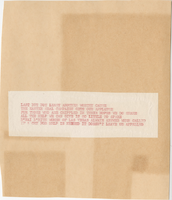
Women's chapter of B'nai B'rith Las Vegas scrapbook pages, 1957
Date
Archival Collection
Description
Scrapbook pages and loose ephemera from the Las Vegas Women's Chapter of B'nai B'rith for 1957. The pages include typed inscriptions and clippings about events.
Text
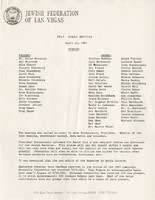
Jewish Federation correspondence, meeting minutes, and other records, item 07
Description
Board meeting minutes for the Jewish Federation of Las Vegas, Nevada, April 22, 1987.
